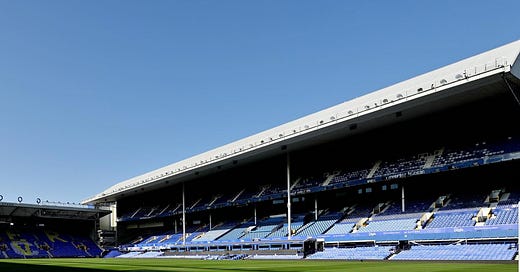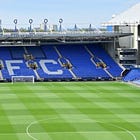Business With Blain: Dan Dares To Pilot EFC To A Brighter Future
Is Everton's ownership fiasco finally going to end?
By JohnB
Less than 100 days ago, The Friedkin Group (TFG) entered a period of exclusivity with Blue Heaven Holdings (BHH), and through negotiations with its principal Farhad Moshiri, sought to acquire a controlling interest in Everton Football Club (EFC).
Less than 100 hours ago, the strong favourite to acquire that controlling interest was American billionaire John Textor, who had stepped in when TFG ‘walked away’ in late July, on or around the expiration of their exclusivity period.
Having withdrawn because they couldn’t make the deal work for them, and with Textor apparently getting close to agreement with Moshiri, TFG upped their game and did what deal-closers do; with a bit of give and take they closed the gap with Moshiri, who appears to have focused on getting the best deal for EFC, and closed the deal.
Yesterday, at just after 2pm BST, EFC issued a simple statement that concluded an intense weekend for owner and suitors alike by confirming that an agreement had been reached between TFG and BHH, and that, subject to regulatory approval from the Premier League (PL), the Football Association (FA), and the Financial Conduct Authority (FCA), TFG would become the new owners of the Grand Old Team that is Everton.
“We are pleased to have reached an agreement to become custodians of this iconic football club. We are focused on securing the necessary approvals to complete the transaction.”
With both parties believed to have signed the Sale and Purchase Agreement (SPA) over the weekend, it ended a tumultuous year off the field that produced as much stress for Everton fans as their on-field performances.
Finally, an end is in sight. The begining of the end, one might say, of the chaotic Moshiri years.
Bloggers and journalists alike have documented Everton’s ownership woes over the last 18 months.
Indeed, the first rumours of Moshiri wishing to sell his stake in the club surfaced as far back as the summer of 2022, with the US-based Kaminski Group mooted to have been in talks. It was in January 2023 that MSP Sports Capital’s interest came to light, with Chairman Jahm Najafi in attendance at Goodison Park when Everton lost 2-1 to Southampton, on a day that was marked mainly by the then-Everton Board claiming they had been unable to attend due to threats to their safety.
The promise of MSP taking the club over after a period of exclusivity was quashed in the summer of 2023, as it seems Rights & Media Funding (RMF), a major lender to EFC, preferred 777 Partners, who subsequently entered a period of exclusivity themselves before their long quest to own this wonderful football club dramatically, but painfully slowly, unravelled over the course of the 2023-24 season.
Then, there was the drama over the summer, but TFG returned to the table (if they ever really left it to begin with).
So, here we are at a place called start. What happens next? How long will it take? And with Everton’s financial situation thought to be perilous, how will they look 100 days from now, when the club enters 2025?
The SPA contractually binds both BHH and TFG, and although regulatory approval could take until the end of this year, there is optimism that the process could conclude sooner. TFG did a fair amount of due diligence during their exclusivity period over June and July, and with their people expected in Liverpool next week to bring their understanding up to date, they will work with Everton to produce the necessary paperwork for submission to the authorities.
In the meantime, as those before them did, TFG will pick up the business-as-usual funding of the club and prepare for their takeover.
“We look forward to providing stability to the club, and sharing our vision for its future, including the completion of the new Everton Stadium.”
Everton fans can expect that TFG will review the stadium project, which is critical to the club’s future, and will seek to ensure that it is on-track, not just from a construction perspective — which under the guidance of interim CEO Colin Chong is on schedule for completion and handover from construction firm Laing O’Rourke in early December — but also that the transition projects are robust and that facilities and third-party contracts satisfy the highest standards.
Having seen Everton penalised twice for breaching the Premier League’s Profit & Sustainability Rules (PSR), fans will be keen to understand what TFG intend to do with the club’s huge debt pile, and when can the club start acquiring better players rather than living hand to mouth, as they have been over recent years, when each season their best players have had to be sold, with those funds rarely then made available for incoming transfers.
Excluding Moshiri’s shareholder loans, Everton have debts of around £600million:
Everton’s creditors
TFG (~£170m)
RMF (~£230m)
777/A-CAP (~£200m)
The approximate repayment costs are £170m in 2025, around £275m in 2026 and up to £150m in 2028.
Some of these must be settled earlier if there is a change of ownership, so we can expect that a negotiated agreement will reduce or settle the debt with 777/A-CAP. There may also have to be some legal/regulatory approval in regards to whatever deal TFG has struck with A-CAP, amid the ongoing case against 777 in the New York courts.
Considering the huge influence they have exercised during the last 18 months, it seems likely that TFG, through EFC, will also settle the outstanding debt to RMF.
That would leave the debt to TFG itself with the PL having influence upon how it is treated with the likelihood being that it will be converted to a shareholder loan or equity.
Finally, as part of the SPA, Moshiri will also convert circa £450m of shareholder loans to equity.
As things stand at the time of writing, it is understood that EFC are incurring interest payments on these loans of around £50m per year, and the upside impact of them being cleared is huge for a business that has an annual turnover of around £200m. Additionally, with the expectation that the new stadium will generate upwards of £50m of additional revenue per season, things start to look promising for even the most pessimistic Evertonian.
Overcoming the challenges facing the club is easier to say than do, and Evertonians will have to be patient for a bit longer, although the pain of recent years is surely ending.
The last quarter of this year will hopefully bring them what they deserve — the completion of their magnificent new stadium and a long overdue change of ownership, and with it a new and focussed Board of Directors.
The Everton that starts season 2025-26 will be different both on and off the field than it is today, and maybe the School of Science will have returned… this time, for good.







Great summary of the situation. Thanks John.